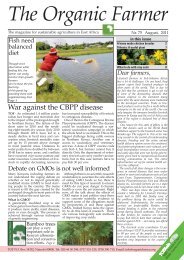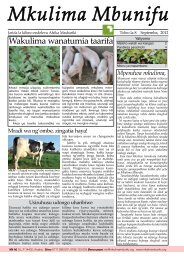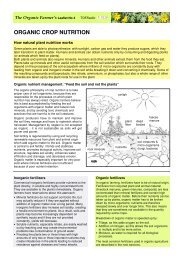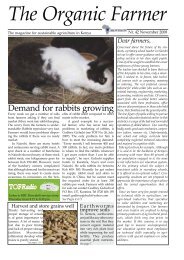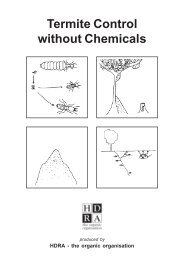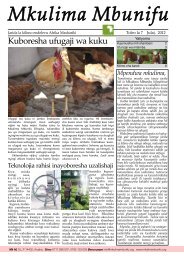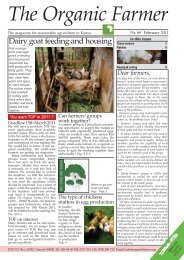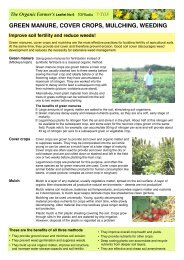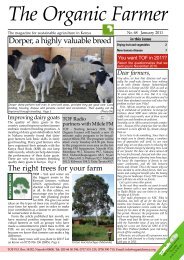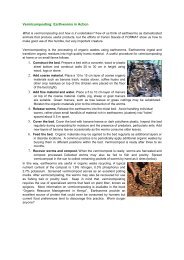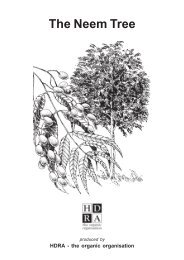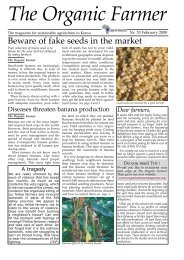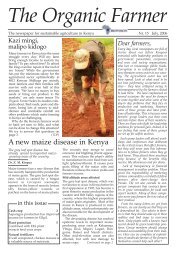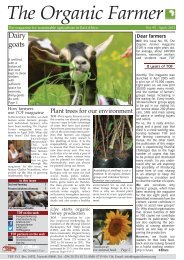TOF, Issue No 81, February 2012 - Infonet-Biovision
TOF, Issue No 81, February 2012 - Infonet-Biovision
TOF, Issue No 81, February 2012 - Infonet-Biovision
You also want an ePaper? Increase the reach of your titles
YUMPU automatically turns print PDFs into web optimized ePapers that Google loves.
Nr. <strong>81</strong> <strong>February</strong>, <strong>2012</strong>Buy quality seed suitable for your regionIt is important to select your seedscarefully before planting. Farmersshould buy their seeds early to avoidbeing cheated.The Organic FarmerSeed is one of the most importantinputs in any crop production operation.If farmers fail to get the rightquality of seed during planting season,this will affect the overall crop yieldand consequently income. As the plantingseason approaches, farmers have tostart thinking about seeds they intendto plant. It is also wise to select seedthat is suitable for their agro-ecologicalzones.One of the reasons farmers continueto experience poor yields is that theygo by what the seed dealers tell themduring seed purchase. A common practiceby all seed dealers is to market newseed varieties claiming they give highyields; but they do not tell farmersthe conditions under which the seedsshould be planted in order to achievethese desired yields.Free market causing shortageThe East African region is now acommon market, which means thatcompanies and even individual tradersin Kenya can sell their products in Tanzania,Uganda, Rwanda and even theSudan and the Democratic Republicof Congo. Much of the certified seedfrom Kenya was sold to these marketsat almost three times the local priceslast year. This led to an acute shortageof certified seed. Many local farmerswere forced to plant any available seed.Dealers took advantage of the shortage.They packed commercial maize ingenuine seed packages obtained fromlocal seed companies and sold it asgenuine seed to unsuspecting farmers.The only way farmers can get qualityTo avoid buying unsuitable or fakeseeds farmers should take the followingmeasures: planting season starts. Farmers whobuy their seeds late fall prey to unscrupulousdealers who sell fake or evenexpired seeds. If you buy your seedsearly, ensure you store them in a cooldry place to avoid spoilage. advice on which seed variety to buy.Seed dealers often mislead farmersbecause their interest is to disposeexisting stock. Insist on seed varietiesyou already know and which you aresure can do well in your area. licensed seed stockists. Buy your seedfrom these stockists as they are moreseed is to buy their maize seed earlyand keep it until the planting time. It isalso very important to know the rightvarieties for their regions. If a farmerwants to plant new seed varieties theyshould test it first by planting it ina small portion of the shamba. Theyshould then observe the characteristicsof the seed variety throughout thegrowing period including the yieldto determine if it is a good varietyfor their climatic zone. Otherwise it isadvisable to go for seed varieties theyknow well.Maize production as a businessAlready many farmers have discoveredthat the early maturing varietiescan be grown in high potential areasand sold as green maize. Since suchmaize varieties are subject to rottingwhen they mature early, the farmerssell it as green maize. At a spacing of75 cm by 30cm, one acre of land canproduce upto 44,000 cobs under goodmanagement.Using the current farm gate priceof Ksh 5 for a maize cob, a farmer canmake between Ksh150,000 and Ksh220,000 from one acre. Besides, themaize stalks can be used as animalfodder or be chopped and ploughedback into the soil to improve fertility.If the maize is harvested in July orAugust, another crop such as beans orImportant tips on seed purchaselikely to have genuine seed. Services (KEPHIS) inspects all seedsold in the country. They inspect everyseed consignment and put a tag onevery seed package. When farmersopen a seed bag, they should checkfor the KEPHIS tag or label to ensurethey have bought genuine seed. Mostfarmers who get cheated don’t checkfor the KEPHIS tag in the seed package. are many seed hawkers who claimthey have genuine seed bought fromappointed seed producers. Some ofthe seed producers sometimes sellseed which has been condemned byKEPHIS. Although they are advisedto sell such seed as commercial maize,many of them end up selling it as seed.maize can be replanted on the sameportion in September or October as asecond crop.Observe weatherIt is beneficial for farmers to plantboth early and late maturity varietiesto reduce the risk of crop failure. Forexample, if a farmer has three acresof land, the same can be divided intothree portions and planted at differenttimes, say mid-March, April oreven May depending on the weatheroutlook. It is also important to relyon the Metereological Department’sweather updates in order to do correcttiming on when to plant.Early planting time has its advantages.Any crop planted early beforethe rains benefits from nitrogen andpotassium that is already in the soil.However, immediately it rains, all thesenutrients are washed down deeper intothe soil- a process called nitrogen flush.Farmers who plant after the rains startlose an average of upto three bags acontinued on page 6Always check for a KEPHIS tag inside the seedpack, or KEPHIS lot number on the pack.
week due to low soil temperaturesaccording to research findings.Maize should be planted at a depth of2.5 cm to 5 cm to avoid damage by ratsand birds. If farmers plant early beforethe rains (dry planting), they shouldmaintain at a depth of at least 5 cm toprevent the maize from germinatingwhen rains are inadequate.Planting bean seedIt is always advisable to intercropmaize with beans. They help to fixnitrogen that is also utilised by themaize. Beans can also be sold beforethe maize matures while the residuecan be ploughed back into the soil toNr. <strong>81</strong> <strong>February</strong>, <strong>2012</strong>Farmer makes money from plant extractsAfter undergoing training throughour i-<strong>TOF</strong> centre, Stephen Ngigewent organic and now sells plantextracts.The Organic FarmerStephen Ngige is a regular reader of TheOrganic Farmer magazine (<strong>TOF</strong>) andthe chairman of Mwimenyi FarmersGroup in Gatuto. In August 2009, helearnt about the opening of the i-<strong>TOF</strong>centre in Gatuto – and immediatelybooked a one day training session forhis group. His colleagues in the groupwere very eager and ready to receivetraining on fundamentals of organicfarming they had read before in <strong>TOF</strong>.The first training motivated them somuch that they proposed to arrangemonthly training sessions.Since this first training, MzeeNgige has adopted several practiceslike compost making, pest management,liquid manure, green manure/cover crops, crop rotation etc. He hasalso taken to new practices in animalfeeding and housing, in line withorganic farming requirements. Thisshift to organic farming has broughthim benefits: He gets more and betterproducts while reducing his inputcosts: He used to spend a lot of moneybuying chemical fertilizers and pesticidesbefore the i-<strong>TOF</strong> training.Going into businessConsequently, Ngige has managed tocontrol damaging pests in his owncoffee plantation; Having learnt thatfertile soils strengthen and contributeimproved production, he startedapplying quality compost to improvehis soils. With this combination, hehas recorded high yields and outputsin terms of cash. This season, MzeeNgige is expecting to get a bumperharvest, enough not only for home consumption,but also for sale in the localmarket. For him, the times of low productionand low income are long gone.After getting practical skills andknowledge on how to make natural“They laughed at me”Stephen Ngige sells a litre of fermentedplant extract (FPE) at Ksh150 only. This is enough to fill fivemanual spray pumps of 20 litreseach, using the ratio of 1:100 (onepart of concentrated solution to100 parts water), “Farmers used tolaugh at me, claiming I was doinga dirty job. But they have seen thatI am reaping the benefits from thework they considered worthless.<strong>No</strong>w, the same farmers are nowmy regular customers”.He is proud of receiving manyvisitors from far and wide, whocome with an intention of learningvarious organic practices thathe uses in his farm or to buy FPE.The products have gained popularityamong many farmers.“The production of high qualityand chemical free products hasbeen my target”, says Stephen Ngige.“To achieve that, one needs to sacrificetheir energy and time. You need towork hard at the beginning, but thereturns are good.”He is eager to promote organicfarming among fellow farmers; wheneverthey visit his farm, he proudlyfrom page 4: Seeds quality may affect your harvestreplenish the soil’s organic matter andnutrients. Most farmers plant a secondbean crop between the maize rowsafter the first bean crop is harvested,increasing their income and furtheradding organic matter to the soil.Usually, farmers do not buy beanseed. They prefer to plant beansfrom the previous crop; they shouldbe selected carefully to ensure theyremove diseased beans or those thatare shriveled. Bean seed should betreated to prevent damage from soilpests and even fungal diseases. Do notplant beans immediately they are harvested.The beans should be properlyshows them the results of the simple,affordable, effective and environmentallyfriendly techniques of pest controlusing locally available resources.“I am glad that the farmers are takingup the message of organic farming,which I heard for the first time in the<strong>TOF</strong> magazine and learned practicallythrough the i-<strong>TOF</strong> centre,” he says.pesticides using the available plants inhis area, Ngige has decided to go intobusiness: Preparing Fermented PlantExtracts (FPE) for sale to other farmers,“After using plant extracts for sometime I realized they were as effectiveas the chemical ones and pests didnot show any resistance; so I startedpreparing them and selling to otherfarmers. My colleagues saw the resultsand within a short period I was in business.”At first, Mzee Ngige sold the FPEsto his fellow farmers in the neighbourhoodat a subsided price. He becamewell known for his products. Manyfarmers now flock to his farm, either tobuy plant extracts or to learn from him.In the last season, there was an outbreakof white flies in Gatuto wherebymany farmers sought help from Ngige.He now has four customers who buyhis products at a wholesale price andretail it to other farmers.Benefits re-investedDuring the white fly outbreak, MzeeNgige sold 200 bottles of FPE andmade Ksh 30’000. With this money, heconstructed an organic zero grazingunit and purchased seeds. Later, heinstalled water pipes in his farm andbought a water pump. <strong>No</strong>w he plansto install a drip irrigation system toimprove his production. And next yearhe intends to get into chicken rearingbusiness; he believes that diversificationis a core principle of sustainableagriculture.dried and stored for a period of upto six months or even one year beforethey can be used again as seed.Farmers who want increased productionshould go for certified bean seedsbecause such beans are disease-free andare carefully selected to give optimumyields. The seed is also treated to ensuresoil pests do not inflict damage beforegermination. Kenya Seed Companyhas a range of bean seeds suitablefor various agro ecological zones inthe country. Farmers should also seekadvise from the extension personnel toknow the beans suitable for both dryand high potential areas.
Nr. <strong>81</strong> <strong>February</strong>, <strong>2012</strong>Human waste can be used but ...The soil here is so depleted and inputsare very costly. Is it safe to recyclehuman waste into our field, or garden?Unfortunately, it is not safe unless youknow how to avoid the risks included.Here are the most important rules:will not carry germs, but it is harmfulto the plants if used directly, withoutfermentation and undiluted. A goodway to recycle urine is adding it to thecompost heap (before the last turningfor maturing). If urine is collected in acontainer, it should be stored for threemonths before it is used in the field; itshould be diluted 1:1 with water.of urine and faeces) takes more timebefore it can be used safely. Diseasecausing pathogens or parasite can bepresent in high numbers. Cholera,typhoid and hepatitis A are the mostdangerous, and worm eggs are especiallydifficult to kill.The climatic conditions are importantfor the storage period until use issafe: in a cool climate (12-20°C), about1.5 years are necessary, while in awarm climate (>25°C), this period canbe reduced to 1 year. If you think ofenriching your compost with humanwaste, the same storage periods shouldbe applied. After this time, the unpleasantodour will also have disappearedcompletely.In case you want to use the contentsof pit latrines, frequent addition ofa layer of soil or ash or both is recommended;this reduces odours andenhances decomposition. Before youuse the material, leave it untouched forthe above mentioned period of timedepending on the temperatures in yourregion. In the meantime, use anotherpit. It is good to have two or more pitswhich you can use in turns.After application to crops, at least onemonth should pass before harvesting.In crops that are consumed raw, suchas tomatoes or carrots, human wastesshould only be applied before planting.There is no danger connected withapplication to fruit trees.Break down of compost needs timeHow well can a farmer speed up thebreakdown of the organic matter andrelease of its nutrients in the soil?Many natural processes are verycomplex and cannot be influencedmuch. You would also not think ofhow to speed up crop growth or thegestation period of your animals sothat they give birth after shorter time.The cycle of organic matter in plantsand soils is extremely complex, andso many factors matter: soil humidity,temperature, time of the season,availability of water and nutrients, soilproperties, type of plant matter etc. Wealso do not see any need to hurry, ascomposting is a continuous process.The best control you may achieve overthe decomposition process is by usinga compost / manure heap where youcan control at least humidity and compositionof the material. In the field,most processes that are happening inthe soil are more difficult to manipulate.Farming traditions are nothingelse but methods of influencing exactlythese processes in a way that is usefulto the farmer, based on many centuriesof experience. Therefore, the best afarmer can do is to follow the simplerules of good agricultural practice: toplant early in the season, to use adequatefertilizers, to use organic fertilizersand to recycle organic wastes, to dothe weeding as is appropriate, and toassist with irrigation if necessary. Thesemeasures will support the cycle oforganic matter on the farm. The worsta farmer can do is to collect organicmatter and burn it, and not to make useof organic residues and animal manureinstead of composting it and bringingit to the field.Dry matter in the compostAnimal wastes and greens are the onesseeming to have an impact on the soil.Why then should we put dry matter inthe soil and yet they have nothing inthe nature?Dry matter or brown coloured wasteResistance against plantextracts is extremely rareWhat should we do to those pests thatare resistant to plant extracts?What you have observed is most probablynot resistance to plant extracts.There are several possible reasons ifpests survive treatments with plantextracts. Especially home madeextracts are difficult to dose as theinsecticidal compounds in plants canvary widely. Here are some reasonsand some advice:not high enough. Make a more concentratedextract next time. or tephrosia do not kill the insectsinstantly. But they make them sick.The pests stop eating and die slowly,or they will not be able to develop intoadult insects (which prevents themfrom multiplying).fullyand should be used immediatelyas they break down quickly in thelight.cientwhen appliedin the evening.it is about to rain, asthe rain will washaway the solution. cationseveral timesabout two times aweek.material like straw, dust from coconuthusks, dried leaves and dried grassesare rich in carbon. In any compostingprocess these carbon and nitrogen richmaterial is to be mixed together tomake the composting quicker ratherthan putting green or brown wasteseparately for composting. Dry matteris also important for the aeration of thecompost heap. It is used as bulkingagent in the composting process. Thisbulking agent gives more air spaceto the compost material. By the way:Sufficient quantity of oxygen shouldbe available inside the compost heap.<strong>No</strong>rmally to allow the fresh air to getinside, the compost heap should beturned upside down, once in fifteendays. Answers: Theresa Székely
Nr. <strong>81</strong> <strong>February</strong>, <strong>2012</strong> 020 445 03 98 0717 551 129 0738 390 715Selling & buyingAloe protects chickens from diseasesThe juice of aloe plant, when addedto the chickens’ drinking water,strengthens their immune system.The Organic FarmerPaul, a small-scale chicken farmer inMolo has kept chicken for many years,but his chickens have remained free ofdiseases all this time. The secret to hishealthy chickens is aloe vera, a commonherb that many people use to preventmany ailments. Every day, when hefills the water basins for the chicken, hepounds a cutting of an aloe vera leaf andadds it to the water. In an open areabehind his chicken house is a gardenwhere two species of aloe are plantedaloevera and aloe secundiflora – notonly because he likes to have the plantthere as for ornamental purposes- theyare handy just in case his chickens fallsick: All aloe types except Aloe verabelong to the group of protected plantsbecause they are endangered; peopleare prohibited from harvesting harvestaloe plants growing in the wild for thisreason. So they prefer to plant them intheir shambas and use them for medicinalpurposes.Remedy against coccidiosisApart from the beautiful flowers, thealoe plants are well known for theirmedicinal value, even for humanbeings; but of more interest for ourreaders is the benefit of aloe to chickens.The juice of the fleshy leaves has antiinflammatoryproperties: It cures infectionsand acts somehow like an antibiotics.According to many scientificstudies, done by KARI, the Universityof Zimbabwe and the Samar College ofAgriculture and Forestry in the Philippines,the juice of the most commonaloe types is very useful especially forchicken farmers. The juice of aloe vera,aloe excelsa and aloe secundiflora protectschickens from coccidioses and cures it;to some extent it also fights the Newcastledisease, but it is, however, importantthat the farmers vaccinates the chickenagainst the Newcastle disease. At least,aloe juice prevents chickens from Newcastledisease infections.Chickens grow fasterBut the most important fact is thataloe juice, when regularly put in thechicken’s drinking water, strengthenstheir immune system. It is a cheapand efficient natural remedy. Thereare interesting findings from SamarState College on the Philippines. In along-term trial, the scientists found thatchickens, when provided regularlywith the juice of aloe secundiflora, grewThe farmer’s questionWhen should I give the organic remediesto my birds, when they are sickor as a regular practice?faster and added more weight comparedto the chicken whose water wasnot enriched with aloe juice.Useful informationIn his overview “EthnoveterinaryMedicine” offers Bernard Wainaina,Director Profarms Enterprises, gives alot of information about useful plants.Ethoveterinary Medicine is a branchof veterinary medicine that uses herbalbased therapies and for animal diseases.The study of B. Wainaina can be downloadedfrom the internet: http://www.ifoam.org, go to search, type ethnoveterinary, andyou will find what you need.Kenbro chicks for sale: Once again webring you the latest batch of Kenbrochicks from Alysaly Poultry. Alsoavailable are 1 week, 2 weeks up to 5weeks. For more details check http://alysalypoultry.kbo.co.ke/ or simplycall us on 0723 619238Kenbro chicks and eggs for sale: Ihave 2-3 weeks old Kenbro chicks forsale, at Ksh 100 per chick and Ksh 25for eggs. Contact Francis Kuria 0722401 139.Poultry and fish for sale: Kili enterprisesbased in Machakos have dayand week old kienyeji and kenbrochicks, Turkey and fish fingerlings.Contact Lilian, Kili Enterprises kili.enterprises@gmail.comIncubators for sale: We have bothimproved paraffin and automaticincubators for sale to interestedfarmers. The incubators have a capacityof between 120 to 2000 eggs. Freedelivery, training and after salesservice provided to farmers, interestedbuyers. Contact Kaki Incubators 0725552 920, 0738 792 224.Ostriches, quails and chickens on sale:We have three-month old Ostriches forsale to farmers, 2 to 6 month Kenbrochicks and chickens weighing between1 and 3 ½ kg. Contact Kaki Incubators0725 552 920, 0738 792 224 email:genkago@yahoo.com, www.facebook.com/kakiincubatorsBamboo for sale: I have bamboo seedlingsfor sale at Ksh 30 per seedling,get in touch with me @ info.mtkenya@gmail.comWould you like to sell your farmproduce, interact with other farmersand share new ideas on the latestfarming technologies or products? Justvisit The Organic Farmer magazine onfacebook at www.facebook.com/theorganicfarmer<strong>Infonet</strong>-biovision is an informationplatform for organic farmers. Whateveryou would like to know aboutthe ecological methods for the controlof pests and parasite infestations ofplants, humans and animals – <strong>Infonet</strong>biovisionwill have an answer. You justgo to the Internet, either at home or ata cybercafe and type in: www.infonetbiovision.orgYou can order the mostupdated version on CD. Send us Ksh200 on 0717 444 405 and then SMSus youraddress,a n dwe willsend youthe CDimmediately.



